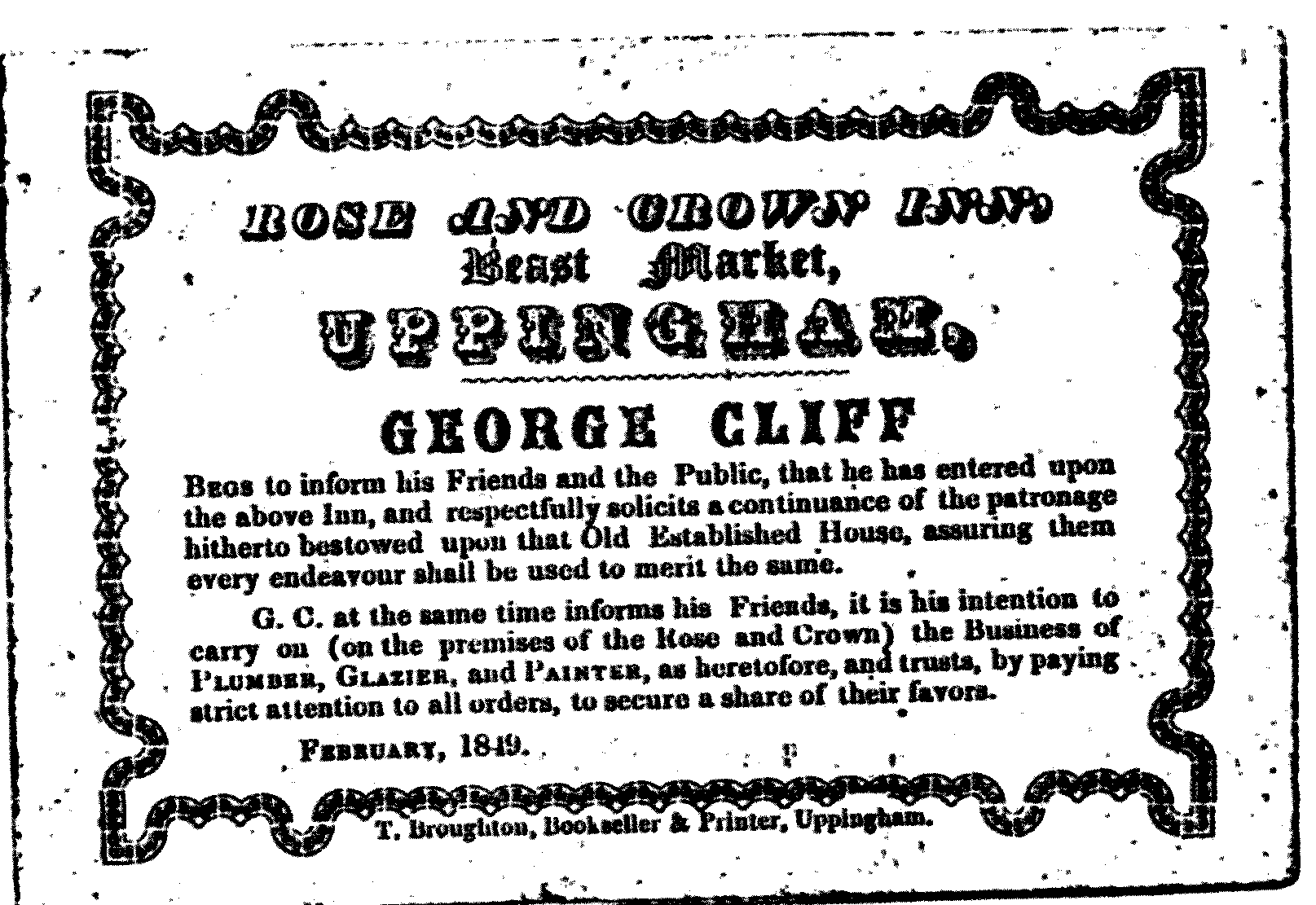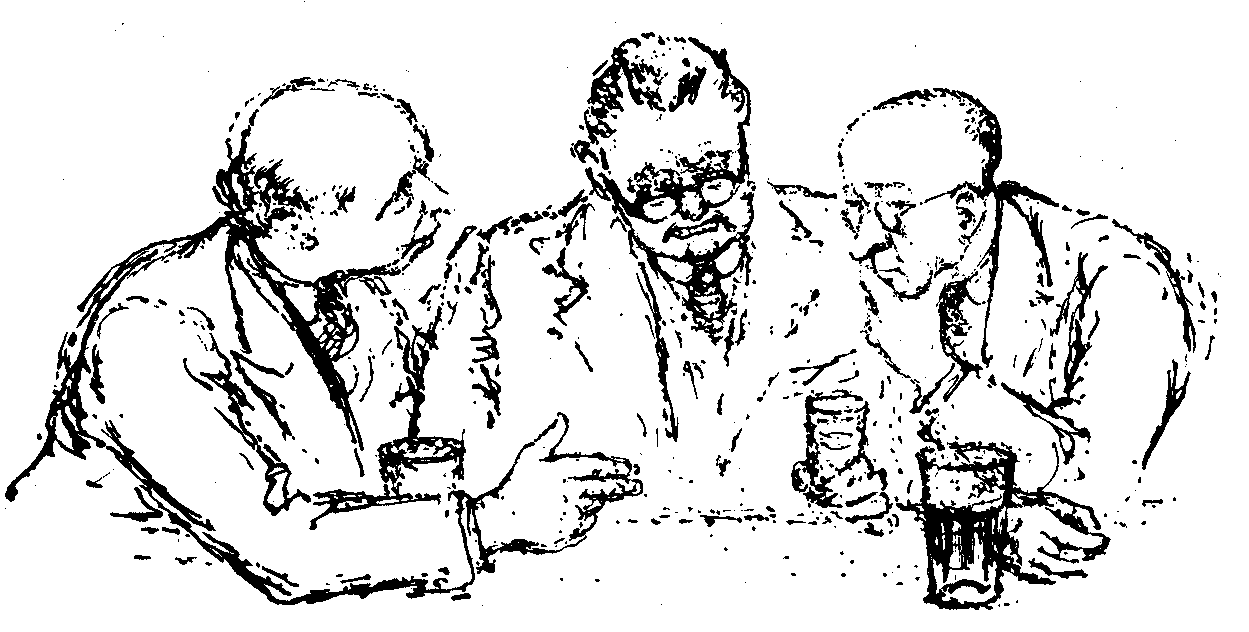
Bar workers about 1895

Advertising card dated February 1849 of George Cliff, publican, plumber and galzier of the Rose and Crown Inn, Uppingham, Rutland. Taken from Uppingham in 1851: A Night in the Life of a Thriving Town published by Uppingham Local History Study Group in 2001.
The extract below is taken from Charles Booth, Life and Labour of the People in London (Macmillan, 1903) volume three of the second series, pages 234-238. It largely describes the work of cellarmen and potmen about 1895. For more about these books see here.
PUBLICANS.
The public-house employee is not included in the figures of this section, but is returned under domestic service. It will, however, be more convenient to make a short statement here as to his hours and wages, rather than to class him with other servants, whose work is of a widely different character.
Barmen - among publicans the cellarman seems to have no existence apart from the barman; in a house where several men are employed some of them perhaps take no part ill the cellar work, but in a small house always, and as general rule throughout the trade, there is no separation of the respective duties.
With very few exceptions barmen are unmarried and live in the house; the wages of a head man vary from 18s to 20s a week, with board and lodging; a second barman will get from 15s to 17s; a third and fourth from 10s to 15s a week. Where only one is employed, his wage will probably not exceed 168s a week. From those sums the only necessary deduction for business purposes is for the purchase and washing of white shirts and aprons, which will amount to about 1s 6d a week. No doubt in cases where the master is careless and unbusinesslike, men have opportunities of illegitimate gain of which they not unfrequently avail themselves; but the introduction of check tills and the system of monthly stock takings, which now prevails in all well-managed houses, have greatly reduced the opportunities for pilfering.
As with other servants, the hours which a barman works depend very largely upon the character of his employer; in a house which opens at 5 o'clock the hours of labour which an inhuman master exacts from his men are at times appalling, amounting in some cases to little short of sixteen on week-days and ten on Sundays; such instances are, however, rare, and the average hours of a barman are twelve to thirteen on week-days, and nine or ten on Sundays, making a week of eighty-one to eighty-eight hours. The majority of houses open at 7.30 or 8 and close at 12.30, from an hour to an hour and a half is allowed for meals, and in few cases do men have less than two hours' rest in the course of the day. In houses which open at 5am, those who have to go on duty at that time are usually able to go to bed at about 10.30pm. It is an invariable custom to give a holiday after 10 or 11 A.M. on one day every four weeks, and till 7 P.M. on every third Sunday, while in some cases men are allowed off from 6 to 10 o'clock on one night in each week.
In the matter of food the barman is probably better off than the average shop assistant who lives on the premises. He has generally an ample supply of good plain fare, and is seldom, if ever, under the necessity of trenching on his wages to supply any deficiency of nourishment.
'The only periods in the year when publicans require extra hands are at Christmas and sometimes for a month or two during the early summer. As the work does not demand any large amount of skin or experience, and there are always a large number of superannuated barmen out of work, there is no difficulty in supplying any additional help which may be required.
The chief grievance of the barman is the very youthful age at which his chance of getting work diminishes; after twenty-four or twenty-five masters begin to look askance at him, and at thirty unless he has become a head man or risen to the position of a manager, his prospects of finding further employment in the trade are very small. This is due part]y perhaps to the fact that masters prefer men who can give and take chaff with the customers and fear that elder]y men may be too staid in their demeanour; but undoubtedly the main cause of barmen being so young, is the dread that masters have that men who have passed their youth will not be content with their wages, but will probably supplement them by intercepting some of the takings before they reach the till, or by other illegitimate methods. There is a strong objection, too, to married men, and as barmen are probably no less susceptible than other members of the community, many no doubt seek for other employment in order that they may enter upon matrimony. Unfortunately, no class of men find it harder to effect a. change of calling; employers generally are said to regard unfavourably those who have been engaged in public-house work and the superannuated barman is consequently under peculiar temptation to join the great army of loafers. It should be remembered, however that there are in the trade a number of well-paid posts as managers, and that the more capable and respectable barmen have the best opportunity of securing these.
Potmen - Inferior to the barman is the potman, a title which is now almost a misnomer. Until comparatively recent years the publican's customers were very particular as to their ale being served in a "nice bright pewter pot,"
and the essential virtue in a pot man was that he should be a good pewter cleaner; the pot is, however, being now largely supplanted by the glass, and the so-called potman is really a servant who does the general work of a public- house.. He usually lives out, and has wages of from 24s to 27s, should he live in he will get from 10s to 14s with
board. In most houses where there is a billiard table he acts in the evening as marker, and thus adds 2s or 3s a week to his earnings, though probably the existence of a billiard table in the house is a factor in the determination of his fixed wage. His hours are less clearly defined and are generally shorter than those of the barman; after he has done his morning's work he is often allowed to go for the whole afternoon, returning about 7 o'clock.
Both barmen and potmen no doubt have great temptation for drinking, but it is probable that they are less liable to actual drunkenness than many other workers. During business hours they are constantly under the master's eye, and pronounced intoxication would most probably result in instant dismissal.

Customers in a Chelmsford pub about 1950.
Trade Organisation.
Among the employees in these trades there is no organisation. Publicans have several associations, including the Incorporated Society of Licensed Victuallers, the City of London Licensed Victuallers and Restaurant Keepers' Trade Protection Society, the East London Licensed Victuallers' and Beer Sellers' Protection Association and a similar society for North London.
Social Condition.
As an index to the social condition of those who comprise these sections, our test of number of rooms occupied is of little value, owing to the fact that the business premises and dwelling place of nearly all those included are under one roof. The small number returned as crowded in each section - 9 per cent under publicans and 4 per cent. Under lodging-house keepers - is due in the one case no doubt partly to a certain proportion of cellarmen, but more largely in both cases to servants who have been wrongly included here.
Click here to read about Barmaids
Copyright 2001. All rights reserved.